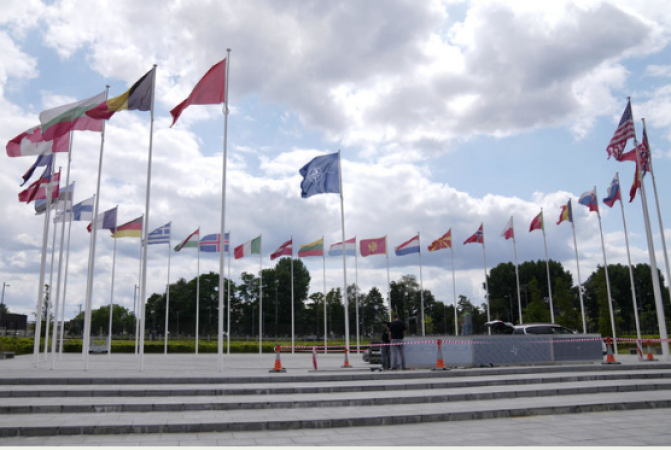
Washington: When leaders assemble for the NATO summit this week in Vilnius, Lithuania, the ongoing Russian invasion of Ukraine will put new strains on the alliance's famed unity.
The largest security alliance in the world is having trouble agreeing to accept Sweden as its 32nd member. Member countries' military spending continues to fall short of established benchmarks. A year was added to the current secretary general's term as a result of the failure to reach a consensus on who should be NATO's next leader.
The issues surrounding how Ukraine should be brought into the alliance are perhaps the most complex. Some claim that allowing Ukraine membership in NATO would fulfil a commitment made years ago and be an essential step in preventing Russian aggression in Eastern Europe. Others worry that it might be perceived as a provocative act that could lead to a bigger conflict.
Also Read: Allied Outcry: US Plan to Send Cluster Bombs to Kiev Sparks International Backlash
Arguments among friends are common, and the current list of disagreements is nothing compared to earlier worries that Donald Trump would abandon the alliance while president. However, the difficulties arise at a time when President Joe Biden and his counterparts are highly motivated to show that members can get along.
According to Douglas Lute, the US ambassador to NATO under President Barack Obama, "any fissure, any lack of solidarity provides an opportunity for those who would oppose the alliance."
Vladimir Putin, the president of Russia, is eager to take advantage of divisions as he struggles to advance in Ukraine and deals with domestic political issues, such as the fallout from the Wagner mercenary group's brief uprising.
You shouldn't create any opportunities, Lute advised. You don't want to show any seams or gaps, she said.
In some ways, the conflict in Ukraine has given NATO, which was established at the start of the Cold War as a defence against Moscow, new life. In order to support Ukraine's ongoing counteroffensive, members of the alliance have sent tonnes of military equipment there, and Finland ended a long period of nonalignment by joining NATO as its 31st member.
The controversial cluster munitions will be given to Ukraine, the US announced on Friday. As it explodes in the air, dispersing smaller "bomblets" across a large area and striking several targets at once, such a bomb poses a higher risk of harm to civilians. Ukraine has pledged to handle it with care.
Italian Premier Giorgia Meloni, one of Western Europe's most ardent supporters of Ukraine in the conflict, reiterated her nation's condemnation of Russian aggression but called for the "universal application of the principles" of the global agreement prohibiting the production, transfer, and stockpiling of cluster munitions in a statement on Saturday night.
Farhan Haq, the deputy spokesperson for the UN, stated that Antonio Guterres "wants countries to abide by the terms of that convention and as a result, of course, he does not want there to be continued use of cluster munitions on the battlefield."
However, the ongoing conflict has given room for other issues to fester or surface.
Leaders of NATO specifically stated in 2008 that Ukraine would eventually join, but little progress has been made in that direction. In 2022, Putin made an attempt to seize Kiev after seizing portions of the country in 2014. This attempt resulted in the current conflict.
Daniel Fried, a former US ambassador to Poland who is currently a distinguished fellow at the Atlantic Council, stated that "a grey zone is a green light for Putin."
Instead of taking the more provocative step of formally inviting Ukraine to join NATO, the US and Germany insist that the focus should be on providing arms and ammunition to help Ukraine win the ongoing conflict.
Estonia, Latvia, Lithuania, and Poland, nations on NATO's Eastern flank, want more certain guarantees regarding potential membership.
Volodymyr Zelensky, the president of Ukraine, is advocating for it as well. He stated that the "ideal" outcome of the Vilnius summit would be an invitation for his country to join the alliance during a visit to Prague on Thursday.
NATO could take advantage of the situation to improve relations with Ukraine by establishing the NATO-Ukraine Council and giving Kyiv a seat at the negotiation table.
Recep Tayyip Erdogan, the main impediment to Sweden's and its neighbour Finland's attempts to join NATO, will also be in the spotlight in Vilnius.
Erdogan charges Sweden with being too tolerant of anti-Islamic protests and militant Kurdish organisations that have fought a protracted insurgency in Turkey.
Swedish anti-terrorism laws were recently changed, and Turkey's arms embargo was lifted. However, Erdogan hinted that there would be further difficulty after a man burned a copy of the Qur'an last week outside a mosque in Stockholm. He equated the "those who permitted the crime" with the actual criminals.
The sale of F-16 fighter jets has also caused a stalemate between the US and Turkiye. Erdogan requests the modernised aircraft, but Biden contends that Sweden's NATO membership must be resolved first.
The US is confident that Sweden will join NATO "in the not-too-distant future," according to Sullivan, but it's not clear if the issue will be resolved during the summit.